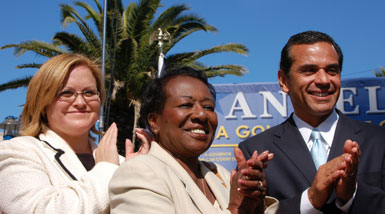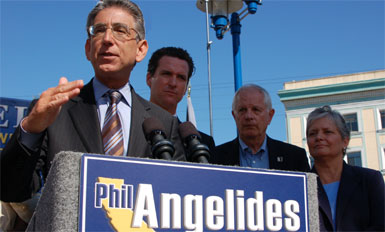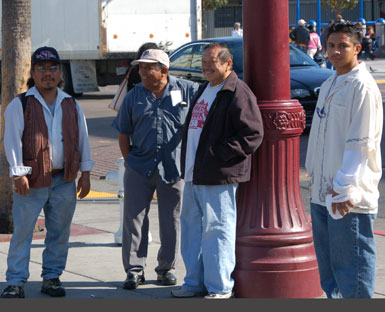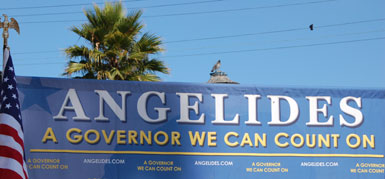I’ll try and explain this difficult decision as best I can with as little hyperbole as possible….. (to read this post with supporting links, please go to: http: //www.veniceforchange.com/2009/02/why-im-voting-no-on-measure-b.html )
Los Angeles relies on coal-fired power plants more than almost any other large city in the country. More than 75% of the electricity DWP generates comes fossil fuels, most of that from coal.
Measure B, the “Green Energy/Good Jobs” ballot initiative promises to generate 400 megawatts of solar power by 2014, save lives by improving air quality (or at least keeping it from getting worse), create thousands of good-paying union jobs and make Los Angeles the solar capital of the United States, all while only costing rate payers an additional $1 a month.
The measure is just one component of a massive three-part plan called Solar LA. The program’s goal is to create a 1.3 gigawatt solar network of residential, commercial and municipally-owned solar energy systems.
According to the literature, Solar LA:
….is simply the largest solar plan undertaken by any single city in the world – with the municpally-owned portion of the plan alone representing more solar capacity than in all of California today. By 2020, the plan will lower carbon emissions in Los Angeles and increase the City’s solar portfolio by nearly 100- fold.”
Measure B is the third part of this program – the municipally-owned part. What it proposes to do is to build and install thousands of solar panels on city-owned buildings and municipal properties such parking lots, parks, schools, etc. all over Los Angeles.
Sounds pretty good, right? As someone who believes in solar power and who’s pro-union (in fact, both my husband and I are union members), I know it sounded great to me. We desperately need a comprehensive solar program. The sooner the better.
But the more research I did, the more I began to question if Measure B will be able to deliver on it’s promises. Ultimately, I came to the conclusion that if passed, Measure B will likely do the opposite, and will instead actually undermine the city’s solar energy efforts.
Here’s why:
Measure B is actually a Charter Amendment. It will transfer oversight of the solar power program from an independent five-member commission with technical expertise to the City Council, which is neither independent in this case, nor technically proficient.
And because the measure would allow the council to change or suspend everything that’s in it, without the normal public hearing process generated by a DWP Commission/City Council partnership, the council’s new authority would not be accompanied by new accountability.
DWP has no experience creating or managing such an ambitious program, and they’re shutting out third-party contractors that do.
DWP has a pretty good record managing it’s distribution networks ( DWP’s customers remained relatively unaffected during the rolling blackouts of 2001). This is because DWP owns and controls both the power generated from coal-fired power plants in Utah and Arizona and the distribution network – in the form of transmission lines – that bring power to us in Los Angeles.
What they haven’t done, though, is actually build the coal plants or the generators. In essence, that’s what DWP is proposing to do for solar – build an equivalent of it’s own power plant – something it’s never tried before. And since Measure B stipulates that all work must be done exclusively by DWP employees (outside the actual manufacture of the solar panels), it’s shutting out outside contractors who have that experience.
Add to this DWP’s spotty management record for other Green Power projects and a history of illegally overbilling clients, and in my mind there’s some cause for concern.
Most DWP workers don’t have the expertise or experience to execute the plan, and the plan won’t allow other trade unions an oportunity to participate.
IBEW, the union representing DWP workers and – not so coincidentally – the authors of Measure B, will solely be responsible for implementing every aspect of the program. The problem, simply, is that most of the work is construction, not electrical. Work DWP has had significant problems with in the past.
Thousands of other trade unionists, like the membership AFL-CIO Laborers Local 300 – who have tons of experience installing solar panels – will be left out in the cold.*
Nobody knows how much this program will cost.
Competing reports put the cost for Measure B (not the entire “Solar LA” program) anywhere from $1.5 billion to over $3 billion depending on which report you believe. The DWP is also apparently counting on a number of tax credits, subsidies, technological breakthroughs, economies of scale, volume discounts, and optimal sightings to drive down costs, none of which has been really vetted or talked through.
Frankly, I think higher rates in exchange for clean, renewable energy can be a fair deal, so that’s not the issue for me. The fact that nobody knows one way or another, however, gives me pause, because this is yet another indicator this measure isn’t fully cooked yet.
We don’t need Measure B to create a municipally-owned solar power program in Los Angeles.
The proponents of Measure B state that a “no” vote is a vote against all solar in LA. Well, this really isn’t accurate. As stated above, Measure B is only one part of a three-part program. The other two parts are completely unaffected by the outcome of Tuesday’s election.
We have alternatives that should be explored.
DWP should be putting more emphasis on creating ways for customers to purchase solar power or solar technology from a variety of vendors to ensure flexibility and encourage healthy competition. Instead, DWP seems determined to concentrate all their eggs in one basket. Their basket.
For instance, DWP does not allow its customers to purchase solar electricity from third-party solar developers, a very popular model in the rest of the state that allows schools and businesses to harness tax credits and hedge against future utility rate increases.
In an LA Times Op Ed, Adam Browning, co-founder and executive director of the Vote Solar Initiative, wrote:
Even worse, during the last legislative session, the DWP supported a bill that would have allowed the utility to raid the state’s SB 1 fund — which was developed under the California Solar Initiative, a program that provides rebates for customers who install solar systems on their roofs and reduce their electricity bills — and use the money for utility-owned wholesale power generation. It was an appalling move, and when my organization asked the governor to veto the bill, he did.
Though the DWP has committed to generating 280 megawatts of solar energy via customer incentives under SB 1, the utility’s plan lists only 130 megawatts that would come from qualifying customer programs. Department officials say they will follow the letter of the law, but it’s pretty clear that they mean to follow the letter of the law until they can get the law changed. That’s unacceptable, and the mayor and the leadership of the DWP should disavow these market-restricting tactics.
I think all this begs the question why, exactly, is Measure B on the ballot in the first place, and how did it get there?
There’s been a lot of speculation that this might be a political move by Mayor Villaraigosa who, at the time Measure B was put on the ballot, feared he’d be facing developer Rick Caruso in a serious primary challenge:
Like most things involving the council and City Hall, this all comes down to money and ambition. At the time Villaraigosa signed on to the extraordinary sleight-of-hand, he was in search of an insurance policy in case billionaire developer Rick Caruso jumped into the mayoral race against him. With its ability to spend unlimited amounts in independent expenditure campaigns waged on a candidate’s behalf, IBEW Local 18 — and Local 11….is pretty good insurance. The council members can hope that the unions and the consultants will remember them and their causes fondly too.
Or maybe Villaraigosa is hoping Measure B will burnish his resume just in time to run for governor in 2010?)
(S)upport for Proposition B helps further align Villaraigosa’s gubernatorial ambitions with two realities of statewide Democratic politics: the growing importance of Latino voters and the concomitant growth of organized labor’s influence.
According to people close to the mayor’s political operation, his hopes of capturing the nomination in the Democratic gubernatorial primary turn on the fact that Democratic races are decided in two places — the Bay Area and Southern California, mainly Los Angeles. Their calculation is that San Francisco Mayor Gavin Newsom and Atty. Gen. Jerry Brown will split the vote of the Anglo-liberals who predominate in the Bay Area, while Lt. Gov. John Garamendi will shave off non-Latino voters in his Central Valley base.
Whatever the reason it ended up on the ballot, I’ll be voting “no” on Measure B. Because with Measure B off the table, we’d have a real opportunity for proponents and critics, the DWP, all trade unions, solar experts, environmentalists, stakeholders, and the City Council to work together to come up with a comprehensive plan to create a workable solution from the bottom up, not the top down.
Vote “no” on Measure B.
*For the record, my husband and I are members of .I.A.T.S.E. Local 700, so we don’t have a dog in this fight.




